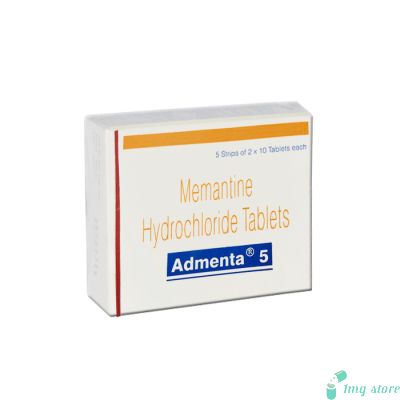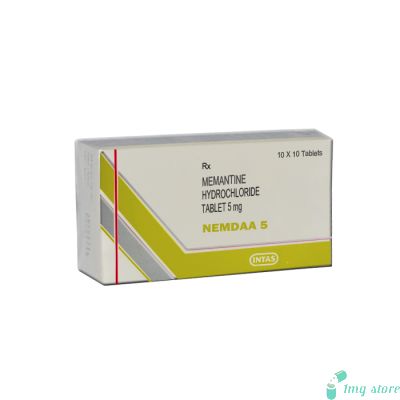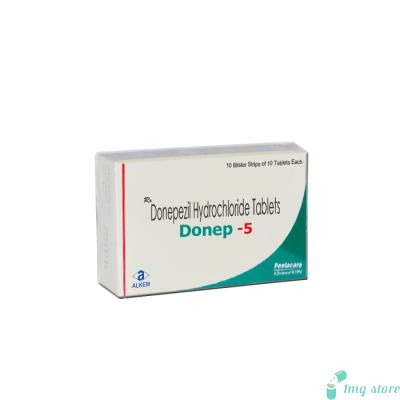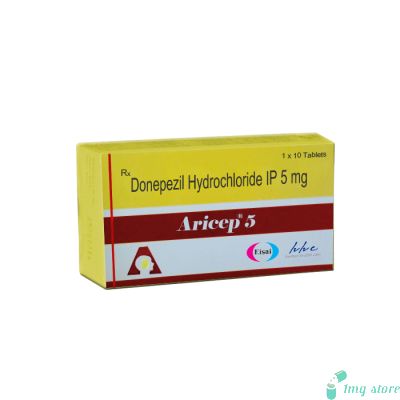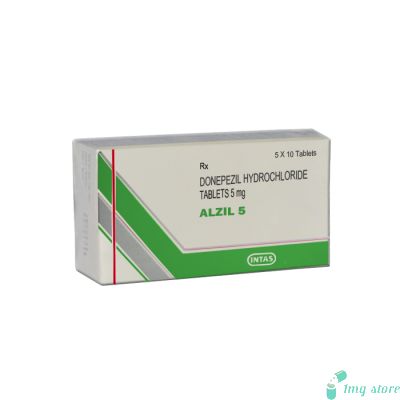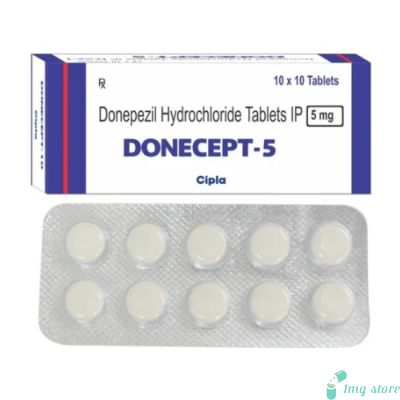Galamer Tablet (Galantamine)
Galantamine Tablet (Galamer) is a medication primarily used for the treatment of Alzheimer's disease. It belongs to a class of drugs known as acetylcholinesterase inhibitors, which work by increasing the levels of a neurotransmitter called acetylcholine in the brain.
Information about Galamer Tablet (Galantamine)
Galantamine Tablet (Galamer) is a medication primarily used for the treatment of Alzheimer's disease. It belongs to a class of drugs known as acetylcholinesterase inhibitors, which work by increasing the levels of a neurotransmitter called acetylcholine in the brain. Galantamine helps to improve cognitive function, memory, and overall daily functioning in individuals with Alzheimer's disease. It is also sold under the brand name Razadyne.
Galantamine Tablet (Galamer) is available in various strengths, typically ranging from 4 mg to 12 mg. The dosage may vary depending on the individual's condition and response to treatment, as determined by a healthcare professional. The doses should be taken as per instructed by your physician or healthcare provider. If you miss the dose then take it as soon as you remember, however, if it is time for the net dose then skip the missed dose and continue with your prescription. It should be swallowed whole and not crushed, chewed, or broken. If a patient is unable to swallow it, it can be dissolved in water or apple juice.
While Galantamine is a widely prescribed medication for Alzheimer's disease, there are also alternative treatments and medications available for managing cognitive decline and memory impairment.
Some Galantamine alternatives include:
Donepezil (Aricept): Another acetylcholinesterase inhibitor commonly used for Alzheimer's disease treatment.
Rivastigmine (Exelon): Another medication that boosts acetylcholine levels and is prescribed for Alzheimer's disease.
Memantine (Namenda): An N-methyl-D-aspartate (NMDA) receptor antagonist that helps regulate glutamate, a different neurotransmitter involved in Alzheimer's disease.
Vitamin E: Some studies suggest that vitamin E supplementation may have potential benefits for Alzheimer's disease management.
Cognitive stimulation and therapy: Engaging in activities that challenge the brain, such as puzzles, reading, and social interaction, can help improve cognitive function.
It is essential to consult with a healthcare professional to determine the most suitable treatment option, including the use of Galantamine or its alternatives, based on individual circumstances and medical history.
Galantamine Tablet (Galamer) offers several benefits for individuals with Alzheimer's disease. By increasing the levels of acetylcholine in the brain, Galantamine helps improve cognitive function, memory, and overall daily functioning. It can enhance attention, thinking, and the ability to perform daily activities, which can significantly improve the quality of life for patients and their caregivers. Galantamine is widely prescribed due to its proven effectiveness in managing symptoms of Alzheimer's disease. However, it is important to discuss with a healthcare professional to understand the potential benefits and risks associated with Galantamine or other treatment options.
It is important to be aware of certain precautions When using Galantamine Tablet (Galamer)
Allergic reactions: Individuals with known allergies to Galantamine or other neurology drugs should avoid its use.
Hepatic or renal impairment: Patients with liver or kidney problems may require dosage adjustments or close monitoring when taking Galantamine.
Gastrointestinal issues: Galantamine can cause gastrointestinal side effects such as nausea, vomiting, and diarrhea. Individuals with a history of stomach ulcers or gastrointestinal disorders should use Galantamine with caution.
Cardiovascular conditions: Galantamine medication may cause changes in heart rate or rhythm. It should be used cautiously in patients with a history of heart conditions or those taking medications that affect heart function.
Respiratory conditions:Razadyne can exacerbate respiratory conditions such as asthma or chronic obstructive pulmonary disease (COPD). Close monitoring is necessary for individuals with these conditions.
Seizure disorders: Galantamine may lower the seizure threshold, making it important for patients with a history of seizures or epilepsy to use it cautiously.
Pregnancy and breast-feeding: The safety of Galantamine in pregnant or breastfeeding women has not been established. Consultation with a healthcare professional is necessary in such cases.
It is important to follow the prescribed dosage and instructions provided by the healthcare professional and report any unusual side effects or concerns promptly. Regular monitoring and communication with the healthcare provider are essential for the safe and effective use of Galantamine or any Neurology Drug.
Primarily the use of Galantamine Tablet (Galamer)
Galantamine Tablet (Galamer) is primarily used for the treatment of Alzheimer's disease. It is prescribed to help manage the symptoms and slow down the cognitive decline associated with this condition.
The utilization of Galantamine is explicitly shown for gentle to direct Alzheimer's illness. It very well may be useful in improving consideration, thinking skills, and the capacity to perform everyday exercises. While Galantamine is not a cure for Alzheimer's disease, it can help improve the quality of life for both patients and their caregivers by managing symptoms and potentially delaying the progression of cognitive decline.
It is important to note that Galantamine is prescribed by healthcare professionals and should be used under their supervision. They will determine the appropriate dosage and monitor its effectiveness and any potential side effects. Galantamine should be used as part of a comprehensive treatment plan that may also include other non-drug interventions, such as cognitive stimulation and therapy.
A few normal results of Galantamine include:
Gastrointestinal issues: The most common side effects of Galantamine are related to the gastrointestinal system and may include nausea, vomiting, diarrhea, stomach pain, and loss of appetite. Taking Galantamine with food or adjusting the dosage may help minimize these effects.
Dizziness and headache: A few people might encounter tipsiness or cerebral pains while taking Galantamine. These side effects are usually mild and transient but should be reported to your healthcare provider if they persist or worsen.
Sleep disturbances: Galantamine can potentially cause changes in sleep patterns, including insomnia or vivid dreams. If sleep disturbances become bothersome, consult your healthcare provider for further evaluation and possible adjustments to the dosage or timing of administration.
Fatigue and weakness: Some individuals may experience feelings of fatigue or weakness while taking Galantamine. These side effects are generally mild and may resolve over time. If they persist or worsen, consult your healthcare provider.
Respiratory issues: In rare cases, Galantamine may cause or worsen respiratory conditions, such as asthma or chronic obstructive pulmonary disease (COPD). If you experience any breathing difficulties or worsening of respiratory symptoms, seek medical attention immediately.
Bradycardia and heart rhythm abnormalities: Galantamine can affect heart rate and rhythm in some individuals, leading to bradycardia (slow heart rate) or other abnormalities. Individuals with pre-existing heart conditions or those taking medications that affect heart function should be closely monitored while taking Galantamine.
Other side effects: Rarely, Galantamine may cause muscle cramps, urinary incontinence, allergic reactions (such as rash or itching), or neurological symptoms (such as confusion or hallucinations). If you experience any of these side effects, seek immediate medical attention.
Q: Can Galantamine Tablet (Galamer) be taken with food?
A: Yes, Galantamine can be taken with food to help minimize gastrointestinal side effects. However, it is essential to follow the specific instructions provided by your healthcare provider or the medication's packaging.
Q: Can I abruptly stop taking Galantamine?
A: No, it is not recommended to abruptly stop taking Galantamine without consulting your healthcare provider. Sudden discontinuation may lead to a worsening of symptoms or withdrawal effects. Your doctor will guide you on the proper discontinuation process, which usually involves gradually reducing the dosage over time.
Q: Can Galantamine be used in individuals with Parkinson's disease?
A: Galantamine is basically shown for Alzheimer's sickness and isn't commonly utilized for Parkinson's infection. Be that as it may, now and again, medical services suppliers might endorse it off-name for specific mental side effects related to Parkinson's illness. It is pivotal to talk with medical care proficient for customized direction.
Q: Are there any age restrictions for using Galantamine?
A: Galantamine can be used in adults of various age groups, including older adults. However, dosages may be adjusted based on individual factors such as liver or kidney function. The safety and effectiveness of Galantamine in children and adolescents have not been established.
Q: Can Galantamine cause sleep disturbances?
A: Galantamine can potentially cause sleep disturbances, including vivid dreams or nightmares. If you experience significant sleep disturbances while taking Galantamine, it is recommended to discuss this with your healthcare provider for further evaluation and possible adjustments to the dosage or timing of administration.
Q: Can Galantamine be used in individuals with asthma?
A: Galantamine should be used with caution in individuals with asthma or other respiratory conditions, as it can potentially exacerbate these conditions. It is important to inform your healthcare provider about your respiratory history to determine the suitability and safety of Galantamine for your specific situation.
Q: Can Galantamine be taken with herbal supplements?
A: It is important to inform your healthcare provider about all the herbal supplements you are taking, as some herbal supplements can interact with Galantamine and affect its efficacy or increase the risk of side effects. Your healthcare provider can provide specific guidance on which herbal supplements are safe to use alongside Galantamine.
Q: Can Galantamine be used in individuals with a history of seizures?
A: Galantamine may lower the seizure threshold, and caution should be exercised when using it in individuals with a history of seizures. It is important to discuss your seizure history with your healthcare provider, who will evaluate the risks and benefits and determine the most appropriate treatment approach for you.
Q: Can Galantamine be used as a preventive treatment for Alzheimer's disease?
A: Galantamine is not approved or recommended as a preventive treatment for Alzheimer's disease. It is primarily indicated for the symptomatic treatment of cognitive decline associated with Alzheimer's disease. It is important to consult with your healthcare provider for information on preventive strategies or other potential interventions.
Some common drug interactions with Galantamine include:
Cholinergic agonists: Concurrent use of Galantamine with other cholinergic agonists (such as bethanechol or neostigmine) may result in an increased risk of side effects.
Anticholinergic drugs: Drugs with anticholinergic properties, like a few allergy meds, antipsychotics, and tricyclic antidepressants, may neutralize the impacts of Galantamine or increment the gamble of secondary effects. It is important to discuss the potential risks and benefits with your healthcare provider.
Drugs that affect liver enzymes: Some medications that affect liver enzymes, such as ketoconazole, fluoxetine, or paroxetine, can alter the metabolism of Galantamine, potentially leading to higher or lower drug levels in the body. Dosage adjustments may be necessary in such cases.
Beta-blockers: Concurrent use of Galantamine with beta-blockers, commonly used to treat cardiovascular conditions, may lead to an increased heart rate or irregular heart rhythm. Close monitoring is important when using these medications together.
Nonsteroidal anti-inflammatory drugs (NSAIDs): NSAIDs, such as ibuprofen or naproxen, may increase the risk of gastrointestinal side effects when used concomitantly with Galantamine.
Warfarin: Galantamine may enhance the anticoagulant effects of warfarin, leading to an increased risk of bleeding. Regular monitoring of clotting parameters is essential when these medications are used together.
This is not an exhaustive list of all possible drug interactions. It is crucial to consult with a healthcare provider or pharmacist to review all medications being taken and to receive personalized advice regarding potential drug interactions with Galantamine Tablet.
| Manufacturer | : | Sun Pharma, India |
| Equivalent Brand | : | Razadyne |
| Generic Search | : | Galantamine |










